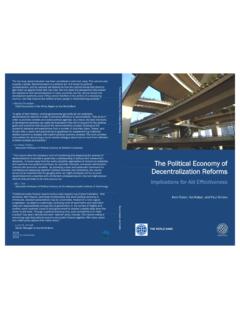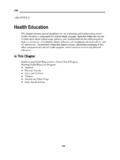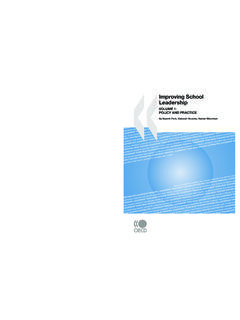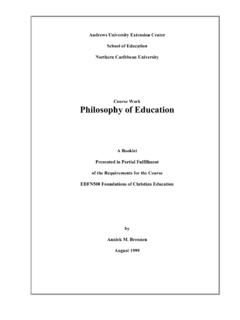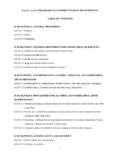Transcription of Textbooks and School Library Provision in Secondary ...
1 WORLD BANK WORKING PAPER NO. 126 AFRICA HUMAN DEVELOPMENT SERIEST extbooks and School LibraryProvision in Secondary Educationin Sub-Saharan AfricaTHE WORLD BANKWORLD BANK WORKING PAPER NO. 126 Textbooks and School LibraryProvision in Secondary Educationin Sub-Saharan AfricaSecondary education in Africa (SEIA)Africa Region Human Development DepartmentTHE WORLD BANKW ashington, 1/14/08 9:56 AM Page iCopyright 2008 The International Bank for Reconstruction and Development / The World Bank1818 H Street, , 20433, rights reservedManufactured in the United States of AmericaFirst Printing: January 2008printed on recycled paper1 2 3 4 5 10 09 08 07 World Bank Working Papers are published to communicate the results of the Bank s work to thedevelopment community with the least possible delay. The manuscript of this paper thereforehas not been prepared in accordance with the procedures appropriate to formally-edited sources cited in this paper may be informal documents that are not readily findings, interpretations, and conclusions expressed herein are those of the author(s) and donot necessarily reflect the views of the International Bank for Reconstruction and Development/TheWorld Bank and its affiliated organizations, or those ofthe Executive Directors of The World Bankor the governments they World Bank does not guarantee the accuracy of the data included in this work.
2 Theboundaries, colors, denominations, and other information shown on any map in this work donot imply any judgment on the part of The World Bank of the legal status of any territory orthe endorsement or acceptance of such material in this publication is copyrighted. Copying and/or transmitting portions or allof this work without permission may be a violation of applicable law. The International Bankfor Reconstruction and Development/The World Bank encourages dissemination of its workand will normally grant permission promptly to reproduce portions of the permission to photocopy or reprint any part of this work, please send a request withcomplete information to the Copyright Clearance Center, Inc., 222 Rosewood Drive, Danvers,MA 01923, USA, Tel: 978-750-8400, Fax: 978-750-4470, other queries on rights and licenses, including subsidiary rights, should be addressed tothe Office of the Publisher, The World Bank, 1818 H Street NW, Washington, DC 20433, USA,Fax: 202-522-2422, email: 978-0-8213-7344-6eISBN: 978-0-8213-7345-3 ISSN: 1726-5878 DOI: photo by Jacob BregmanLibrary of Congress Cataloging-in-Publication Data has been RequestedWP 1/14/08 9:56 AM Page iiContentsForeword.
3 ViiAcknowledgments.. ixAbbreviations.. xiExecutive Summary.. xviiR sum analytique.. xxvIntroduction: Methodology and Constraints.. 1 PART I: Secondary Textbooks .. Requirements and Costs in Secondary education .. 5 Different Types of Secondary education .. 5 Variations in Secondary textbook Requirements and Costs .. 5 Average textbook Prices and the Causes of Variation .. textbook Financing.. 15 Sources of Finance for Secondary Textbooks .. 15 Producer versus Consumer Funding .. 16 Principles of Effective textbook Financing .. 17 textbook Cost Reduction Strategies .. 18 textbook Rental Schemes and textbook Revolving Funds .. 19 The Importance of the Secondhand textbook Market .. 23 Piracy and Pamphlets .. 23 Textbooks as a Percentage of Secondary EducationCosts: A Case Study from Lesotho .. 23 Textbooks as a Percentage of Secondary EducationCosts: A Case Study from Uganda .. 25 textbook Financing in Francophone Countries .. Textbooks Availability.. 31 textbook Availability in Uganda (2002/03).
4 31 textbook Availability in Lesotho (2003) .. 34 textbook Availability in Zambia (2002 and 2005) .. 35 textbook Availability in Mozambique (2000/2001) .. 36 Notes on textbook Availability in Other Countries .. 37iiiWP 1/14/08 9:56 AM Page textbook Lists.. 43 Approved Secondary textbook Lists .. 43 Rationale for Approved textbook Lists .. Issues for Secondary Textbooks .. 47 Current Patterns of Secondary textbook Distribution .. 47 Traditional Problems with State textbook Distribution .. 47Re-Creating National Bookseller Networks .. 54 Current Secondary textbook Distribution Issues.. textbook Authorship and Publishing.. 59 Secondary School textbook Publishing in Francophone Africa .. 59 Secondary School textbook Publishing in Anglophone Africa .. 61 PART II: Secondary School Libraries.. School Libraries in Sub-Saharan Africa.. 71 Secondary School Library Provision .. 71 Financing Secondary School Libraries.. 74 Other Characteristics of Secondary School Libraries.
5 74 Linkages to National Library Systems .. 76 School Library Management .. 76 Distribution Issues.. 77 School Library Policy Issues .. 77 School Library Cost Implications.. an Effective Strategy for Secondary Textbooks and Libraries.. 81 The Uganda textbook and School Library Proposal .. 82 textbook Rental Schemes .. 83 Other Forms of textbook Cost Reductions.. 85A Schematic Instructional Materials Budget .. 89 Secondary School Libraries, Reading Books and Reference Materials .. 90 Recommendations .. 91 Annex: Senegal textbook Committee.. 93 Bibliography.. 97 LIST OFTABLES1. Secondary textbook Requirements and Costs in Selected Countries .. 62. Average Unit textbook Costs by Grade Levels in Selected Countries( dollars) .. 10ivContentsWP 1/14/08 9:56 AM Page iv3. Simplified Accounts of a Church School .. 244. Simplified Accounts of a Government of Lesotho (GoL) School .. 255. Purchasing Power of School textbook Budgets (based on 11 Uganda Schools).
6 286. textbook Availability in Lesotho Schools (2003) .. 357. Secondary textbook Distribution Systems in Selected Countries .. 488. Cost of Basic textbook Provision at One School in Uganda for S1 to S6 (2002) .. 829. National Cost of Basic textbook Provision for S1 to S6 .. 8210. Unit Costs per Student of Basic textbook Provision (including the costof Provision of teachers copies) .. 8411. Cash Flow by Grade Levels in a Schematic Full textbook Rental Scheme.. 8612. Cash Flow Summary of Table 11 for All Grades .. 88 LIST OFBOXES1. Example of Alternative Page Requirements .. 792. Typical Annual Rental Fee Formula .. 84 ContentsvWP 1/14/08 9:56 AM Page vWP 1/14/08 9:56 AM Page viForewordMany African countries are undertaking important economic reforms, improvingmacroeconomic management, liberalizing markets and trade, and widening thespace for private sector activity. Where such reforms have been sustained they producedeconomic growth and reduced poverty.
7 However, Africa still faces serious developmentchallenges in human development, notably in post-primary education . The World Bankincorporated this within its Africa Action Plan (AAP) by underscoring the fundamentalimportance of expanding not only primary but also Secondary and higher education , andlinking it to employment options for African education for All-Fast Track Initiative (EFA-FTI) involves over 30 bilateral and inter-national agencies and has made important strides. In the coming years, the key challenges areto consolidate progress towards universal primary education and expand Secondary schoolaccess in response to economic and social demands. Secondary education and training are pre-requisites for increased economic growth and social development. It promotes productivecitizenship and healthy living for young adolescents. To be competitive labor markets in Africaneed more graduates with modern knowledge and better skills. Asia and Latin America haveshown these trends convincingly.
8 However, expansion of post-primary education serviceswhile simultaneously improving its quality will require African countries to deliver these serv-ices more efficiently. Adoption of innovative and best practices from other Regions can Secondary education In Africa (SEIA) study is part of the Africa Human Devel-opment Program that supports the Region s Africa Action Plan. Its objective is to assistcountries to develop sustainable strategies for expansion and quality improvement in sec-ondary education . The study program produced eight thematic studies, and additionalpapers, which were discussed at the regional SEIA conferences in which 38 countries andall major development partners participated (Uganda 2003; Senegal 2005; Ghana 2007).The SEIA Synthesis Report (2007) is a summary overview and discussion of all studies. AllSEIA studies were produced with the help of national country teams and internationalinstitutions for which financial trust fund support is gratefully acknowledged.
9 Studyreports are available on the SEIA website: study is about Secondary textbook and School Library Provision in Sub-Saharan is based on research in Botswana, Cameroon, Cote d Ivoire, Ghana, Kenya, Malawi, Rwanda,Tanzania, and Togo, existing recent country reports on textbook Provision , and extensive deskresearch. There are considerable variations in Sub-Saharan African textbook requirements thatare needed to meet Secondary curriculum specifications. Also, there are significant differentialsbetween and within countries in regards to the average price of recommended countries do not have an approved Textbooks list. This study discusses secondarytextbook and School Library availability in Africa, its cost and financing, and its distributionand publishing. The study objective is to analyze the issues and provide some options andstrategies for improvement. I hope this report will make a timely and useful BregmanLead education Specialist and SEIA Task Team LeaderAfrica Region Human Development (AFTHD)The World BankviiWP 1/14/08 9:56 AM Page viiWP 1/14/08 9:56 AM Page viiiixAcknowledgmentsThe editorial team would like to express thanks and to acknowledge the contributionsof the nine country contributors who provided much of the core data on which thisresearch study is based.
10 All are leading African Secondary School publishers, booksellers orAfrican educationists with a deep knowledge of their own national School systems. Theynot only undertook local research into current Secondary School textbook and schoollibrary Provision in their own countries but also provided fast and detailed responses to awide range of follow-up queries as , a number of leading African, UK, and French publishers submitted to semi-structured interviews on their views and experiences of Secondary School Textbooks andlibraries in sub-Saharan Africa. Brian Jones of Evans Bros, Kern Roberts and Jenny Pares ofPearson, and Deborah Brierley and Rachel Arumugam of Harcourt were particularly Bontoux took responsibility for research into francophone Secondary textbookexperiences. Amanda Buchan concentrated on Secondary School Library Provision , DavidFoster on textbook requirements and textbook costs and affordability and Tania Bapujiresearched distribution issues and undertook the web searches for relevant reports, projectinformation and other required data.





